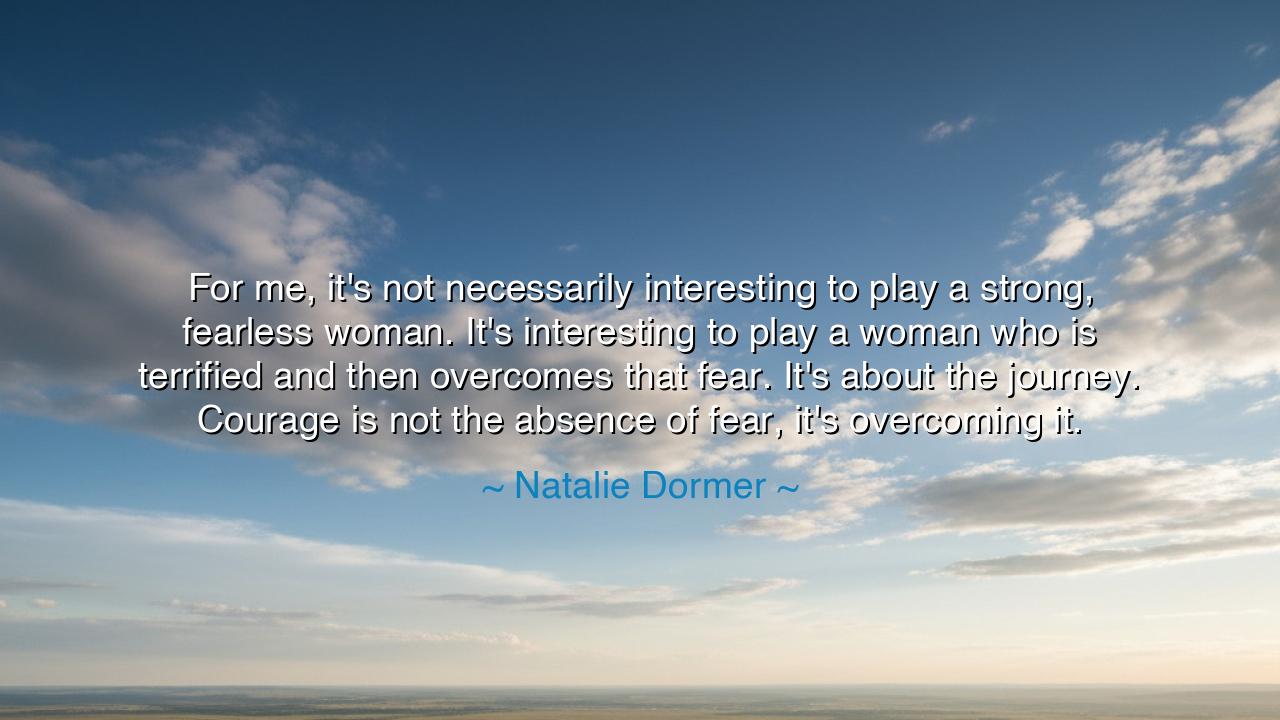
For me, it's not necessarily interesting to play a strong
For me, it's not necessarily interesting to play a strong, fearless woman. It's interesting to play a woman who is terrified and then overcomes that fear. It's about the journey. Courage is not the absence of fear, it's overcoming it.






The actress Natalie Dormer, known for her portrayals of women both intelligent and complex, once spoke words that pierce beyond the realm of performance and into the soul of human experience: “For me, it’s not necessarily interesting to play a strong, fearless woman. It’s interesting to play a woman who is terrified and then overcomes that fear. It’s about the journey. Courage is not the absence of fear, it’s overcoming it.” These words, though spoken of art, reveal a timeless truth about life itself. For what is existence, if not the great stage upon which every soul must face its own fear, fall to its knees, and rise again with trembling hands? Courage, Dormer reminds us, is not the cold defiance of the fearless—it is the warm, beating heart that dares to keep going despite its terror.
The origin of this wisdom is ancient, though expressed anew in Dormer’s reflection. From the dawn of philosophy, the wise have sought to define courage. Aristotle wrote that true courage lies between cowardice and recklessness—that it is not the denial of fear, but mastery over it. To be without fear, he said, is not to be brave, but to be insensible. The brave person feels the dread of danger, yet chooses to act in spite of it. In her words, Dormer echoes that lineage, not as a philosopher in robes, but as an artist who has lived that truth through the stories she embodies. She reminds us that fear is not weakness—it is the test that reveals our strength.
It is easy to admire the fearless, to mistake their calm for power. But the greater story, the one that moves hearts across ages, is always that of the fearful who found within themselves the will to endure. Consider the tale of Joan of Arc, a young peasant girl who stood before kings and armies, trembling, yet resolute in her conviction. History remembers her as brave, yet her letters reveal her humanity—her doubts, her dread, her prayers whispered through tears. It was not in her absence of fear that her greatness lay, but in her defiance of it. Her courage was born of faith and fire, not of calm indifference. In her, as in Dormer’s words, we see that the most inspiring heroes are those who suffer the full weight of fear and rise nonetheless.
Fear, then, is not our enemy, but our companion—an ever-present shadow that walks beside us, reminding us of what is at stake. Without it, there can be no triumph. The warrior who feels no fear knows no victory; the artist who risks nothing creates no truth; the soul that never trembles never grows. Courage is the bridge that carries us across the chasm between despair and hope. It is not a gift bestowed upon the chosen few, but a virtue cultivated through choice. Every act of bravery—great or small—is a victory over the self, a rebellion against paralysis.
Dormer’s insight speaks also to the art of becoming—not only as an actor on the stage, but as a human being in the world. She says it is “about the journey,” and indeed, that is where the power lies. The transformation from fear to courage is the true drama of life. The soldier who marches toward battle, the mother who faces hardship to protect her child, the student who dares to dream beyond the limits of doubt—all live this story. It is not perfection that ennobles them, but the struggle. In every trembling step forward, the soul writes its own legend.
The lesson is clear: do not seek to be without fear; seek to act rightly in spite of it. The one who denies fear denies a part of their humanity. But the one who embraces it, confronts it, and overcomes it, becomes truly powerful. When fear rises, as it surely will, meet it not with shame but with resolve. Say to it, “You are the sign that I stand on the edge of something meaningful.” For only by stepping through fear do we enter the realm of growth and greatness.
Therefore, my child, remember this teaching: courage is not the absence of fear, but the triumph over it. When you tremble, you stand on sacred ground. When you feel doubt, know that your heart is alive. Let fear be the forge in which your spirit is tempered, not the chain that holds it down. And as you walk your path—whatever it may be—rejoice not in being fearless, but in being faithful to your purpose even when you are afraid. For in that trembling persistence, you will find what Dormer and the ancients alike knew to be the highest art of living: the courage to overcome.






AAdministratorAdministrator
Welcome, honored guests. Please leave a comment, we will respond soon